Please complete the form below, and one of our experts will be in touch.
If you would like to send a technical drawing with your enquiry, please email heavysprings@lesjoforsab.com
There are very few metal spring materials we can’t access or work with, and we hold one of the largest global stocks of chrome silicon and chrome vanadium wire anywhere in the world.
We also work with a diverse range of steels, copper and titanium alloys, as well as super alloys, including Inconel, Hastelloy and Nimonic.
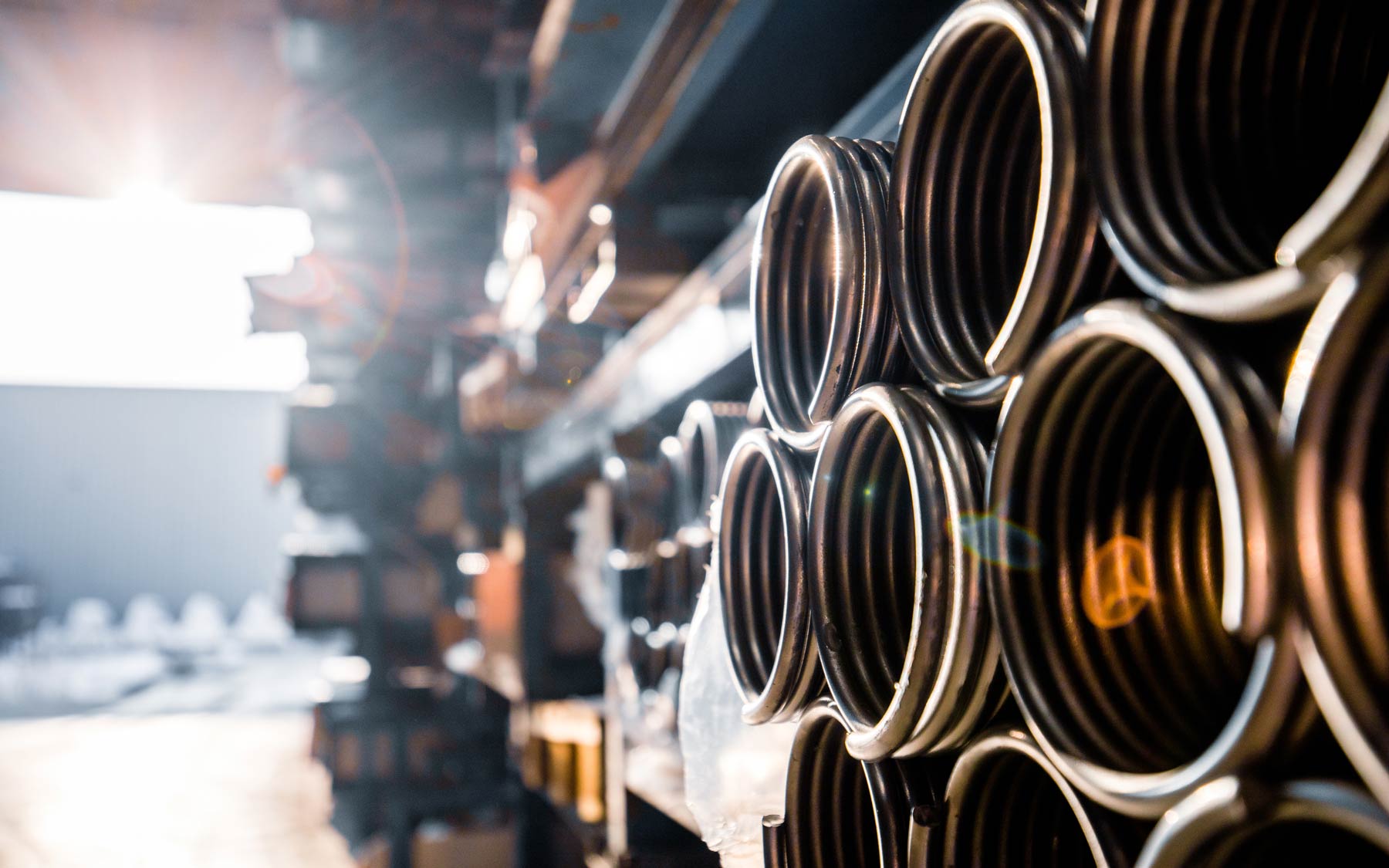
The most distinguishing property of a coil spring material is its mechanical strength and elasticity.
We believe there are four key components to consider when choosing the best material for metal springs:
This recipe of elements combines to form alloys specifically tailored to meet your needs. Broadly grouped as spring steels, there are three main groups :
A small group of super alloys complete the line-up, such as Inconel, Nimonic and Hastelloy.
Various combinations of elements allow the materials to have different properties, from high strength to excellent corrosion resistance, extreme temperature performance to the ability to withstand the harshest acidic environments. In spring materials, the smallest adjustment of constituents can make a big difference.
The surface properties of spring steels have a huge influence on the expected fatigue life of a spring. With most spring failures originating from a surface defect or some form of damage, it is incredibly important to start with the highest quality surface finish wire. International standards dictate stringent limits on surface defects and inclusions, which is why our wire is always sourced from leading accredited suppliers and treated with the utmost care with full traceability from the raw material rod to the finished product.
The measure of force that material can withstand before breaking.
Higher tensile strength materials allow our design engineers to offer higher stressed and increasingly more efficient spring solutions. This saves weight, uses less material and therefore lowers costs.
Wire diameter, in conjunction with tensile strength, will determine the spring's overall design and maximum performance.
Springs used in high-temperature environments lose strength – suffering spring relaxation. It is essential you choose the right material for your spring application.
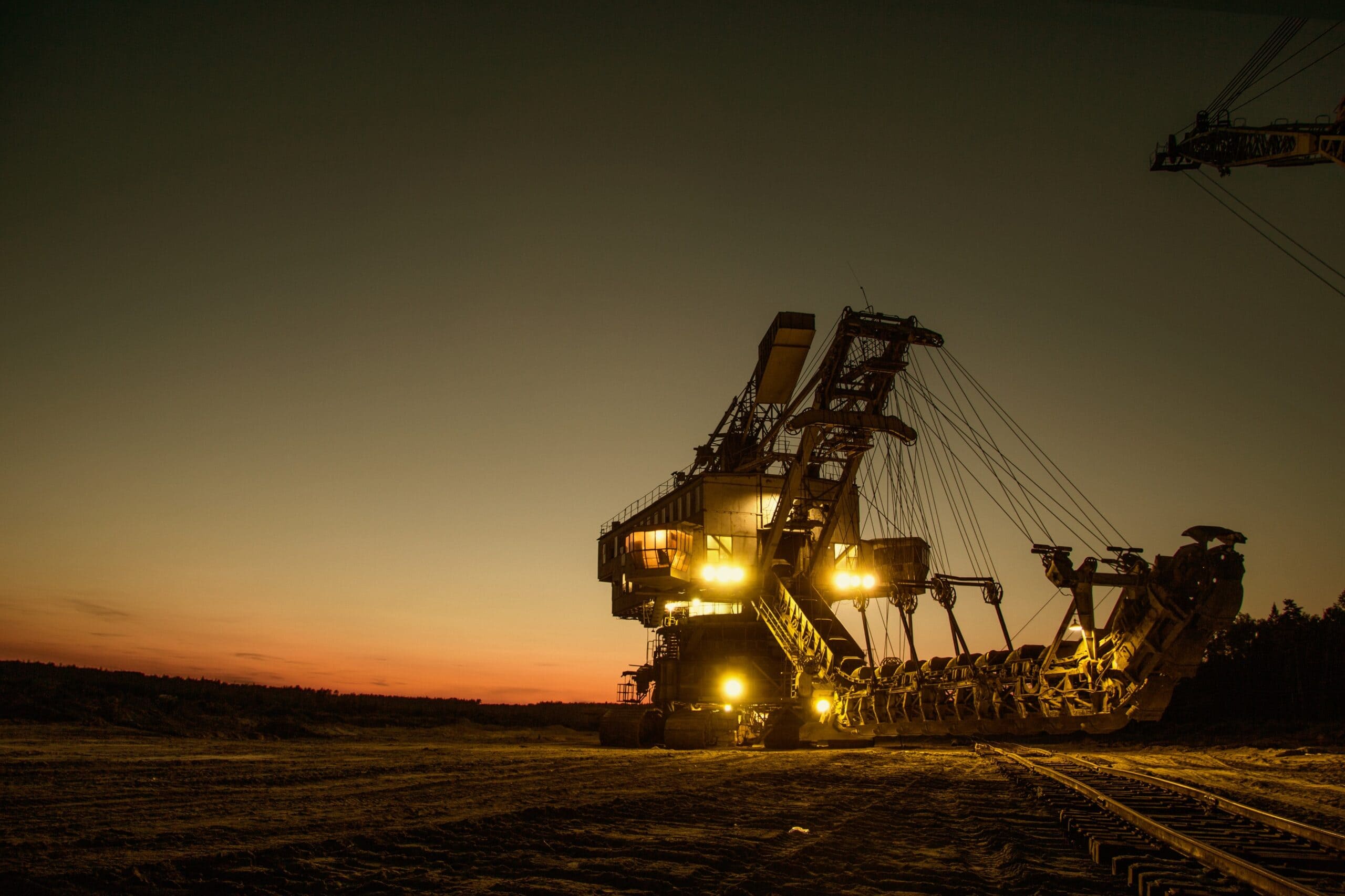
Stainless steels and super alloys both offer excellent corrosion resistance. This is because the chromium in the steel quickly forms an oxide layer on the surface of the steel that prevents further corrosion.
Standard 302 stainless offers good general resistance to the atmosphere. By adding additional elements such as molybdenum, we can gain extra protection in marine environments and some acidic resistance.
For ultimate protection in extreme environments, we look to super alloys. Inconel, Elgiloy and Nimonic all offer great corrosion resistance by varying the oxides that form to protect your spring.
Material prices not only reflect the quality and capabilities of the material but are also affected by global supply issues and economics.
We want the right outcome for you, and our engineers can advise on cost-saving efficiencies by discussing the requirements behind your spring engineering. If there is a more economical material that will deliver the performance you require from your metal spring, then we will advise and ensure you secure the best outcome.
As a division of the Lesjöfors group, our purchasing power enables us to access and secure a wide material supply at competitive prices.
Spring materials can include anything from silicon chrome, chrome vanadium wire, steel, copper and titanium alloys. The choice depends on the specific application and performance requirements, from high-strength alloys designed to withstand extreme loads to corrosion-resistant materials for harsh environments. Each material is carefully selected to deliver the right balance of strength, flexibility and durability.
We’re often asked what type of steel coil springs are made from, and the answer is dependant on the environment, demand and application of that metal spring.
For example, a large steel spring, when cold formed, needs a high mechanical strength with enough ductility (the measure of a material's ability to plastically deform without fracturing when placed under tension) to allow it to be formed. When hot-coiled, large steel springs need different parameters such as pre heat treatment, post-coiling quenching and tempering. They are all adjusted according to the set standards and required spring properties.
Properties of steel:
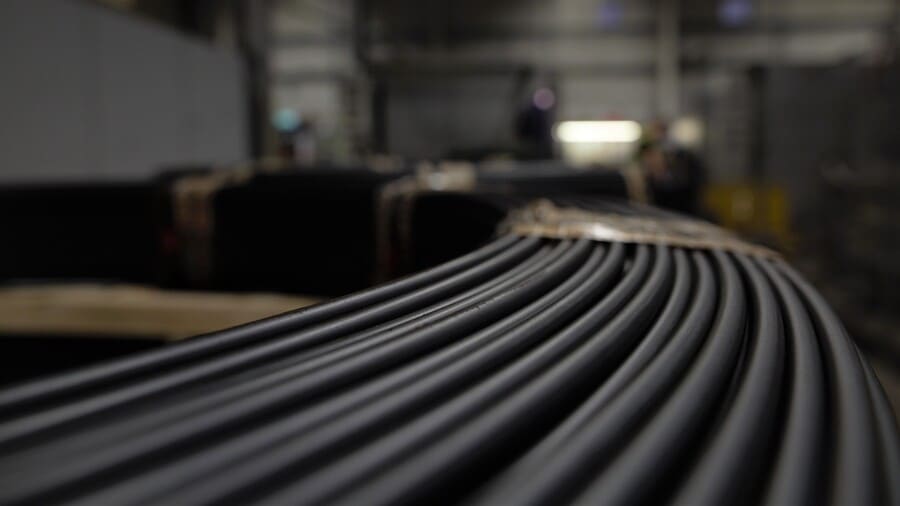
The properties of steel can be altered by alloying (changing the chemical composition), heat treatments (changing the internal structure of the material) and cold working (plastic deformation of the material).
The most important properties, like, hardness and toughness, are largely dependent on carbon content.
Steel is chemically built mainly of iron and carbon and consists of alloying elements and impurities. Non-stainless steels generally have more than 95% iron, and austenitic stainless steel springs between 60-75%.
Common alloying elements are silicon (Si), manganese (Mn), chromium (Cr), nickel (Ni), molybdenum (Mo), tungsten (W) and vanadium (V).
The most important impurities are sulphur (S) and phosphorus (P). Generally, these elements decrease toughness and ductility.
Our teams of metallurgists and quality engineers are on hand to discuss, assess and advise on all our spring materials and processes, ensuring the right choice of material delivers the right function at the right price.
Consequently, we hold one of the largest global stocks of chrome silicon and chrome vanadium wire anywhere in the world.
Chromium is a common alloying element in non-stainless spring steels. It not only raises the strength of the material but, most importantly, increases the hardenability of steel. This becomes more important as the dimension of the material increases and as such is a core material choice for our heavy-duty spring manufacture.
Molybdenum has a similar effect on hardenability and is added for even larger dimensions.
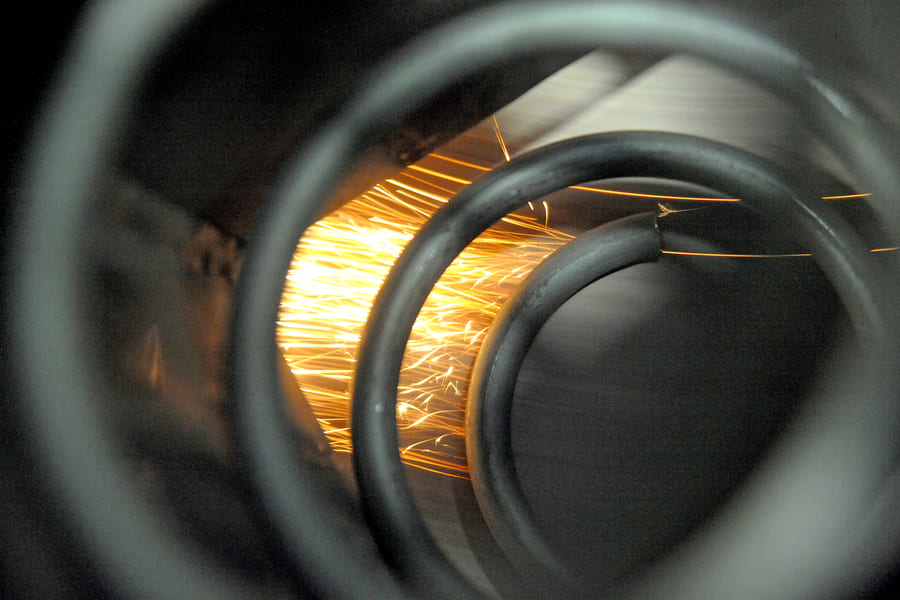
Chrome coil springs are the powerhouse of spring material choice.
When assessing material choice and reviewing a chrome silicon spring V stainless steel spring, it is important to understand the parameters of the spring's function and application alongside material choice.
We know springs, we know spring materials, and if you would like to discuss spring engineering with us, please do get in touch.
The environment the spring operates in determines the type of alloy chosen, i.e. Inconel 625 performs well in Nitric acid, whereas Monel 400 is the best choice for caustic soda.
Elgiloy and its resistance to hydrogen-induced cracking are useful in the offshore oil and gas industries to meet NACR MR-0175.
Spring prototype development is key to a spring’s performance and success. Establishing the best engineering and material route for our customers’ metal springs delivers the quality we pride ourselves on and that our customers expect.
The expertise of our experienced engineers is unmatched. As part of a global network of spring engineering material scientists, you can guarantee that your metal spring will perform at peak with the right material for the right function.
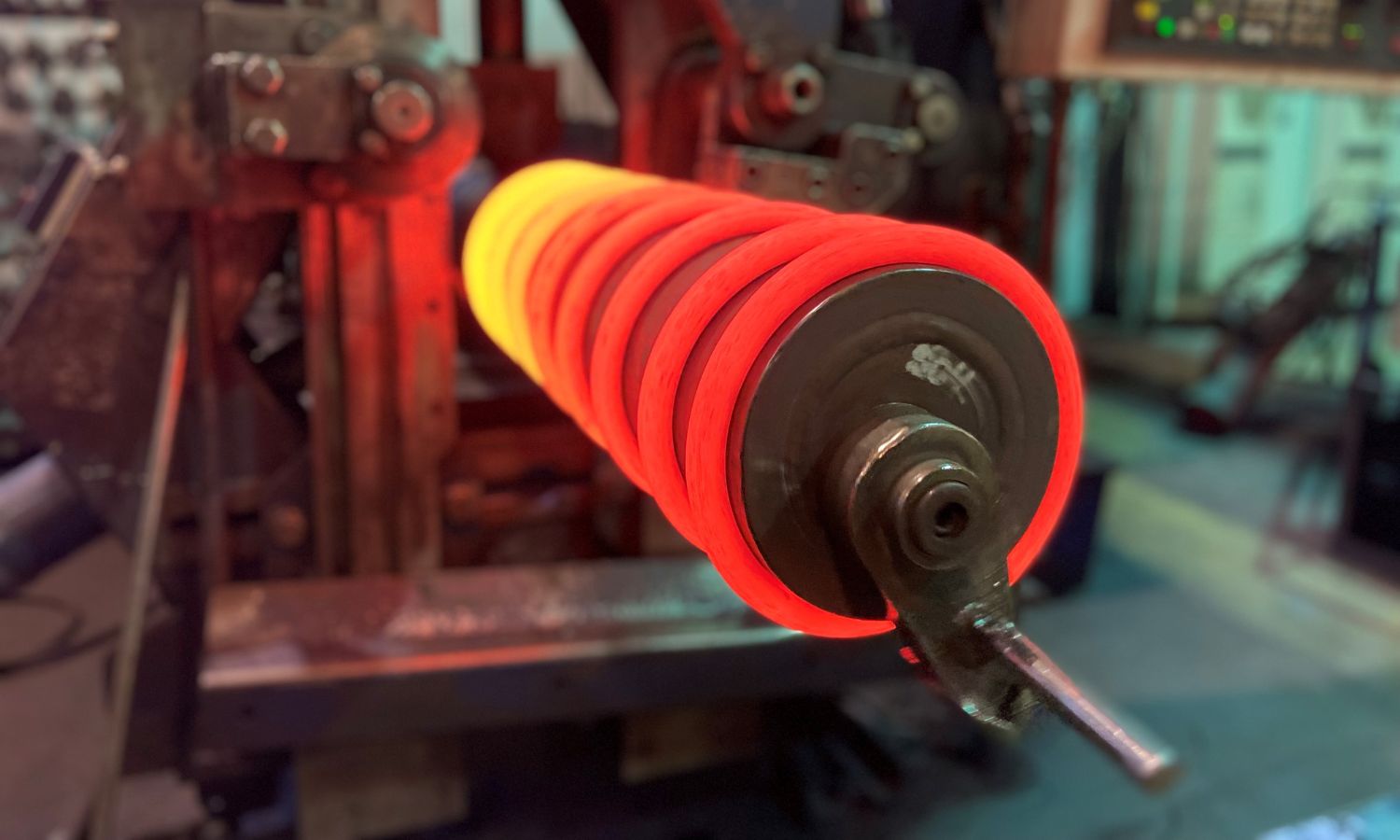
State-of-the-art heavy spring manufacturing machinery places us at the forefront of advanced coil spring manufacturing processes.
With the widest range of large-scale, high-end hot and cold spring coiling machines, we provide the highest quality precision spring manufacturing.
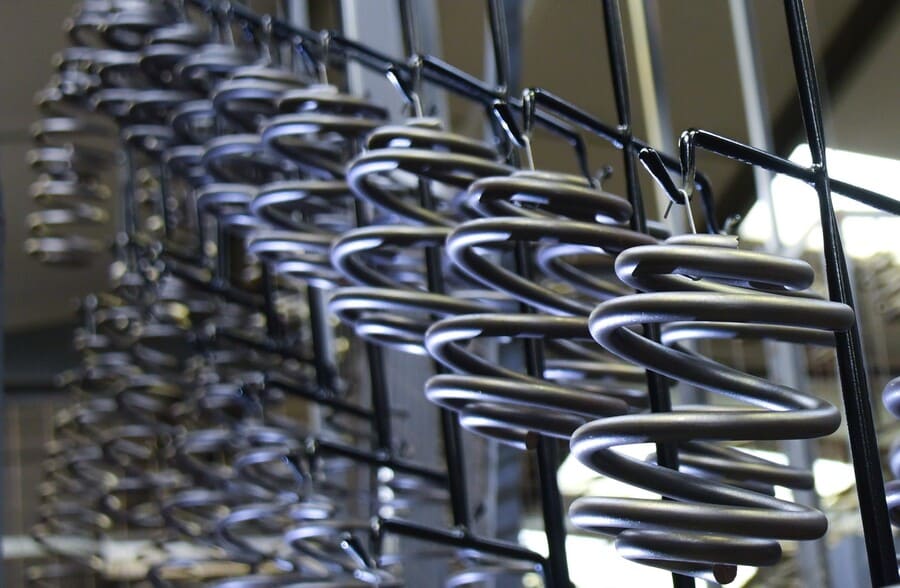
Spring material and spring type often work in synergy. Examine the spring types we offer before choosing your material.
Striving to deliver environmentally sustainable solutions, securing ethical metals and continuously developing and committing to ISO 14001 and ISO 9001 standards keeps our teams laser-focused on our environment and quality management systems.
We explore sustainability across our environmental, economic and social practices. Earlier this year, Lesjöfors Fjädrar in Sweden switched to biogas, a fossil-free energy source. The green transition reduced the company’s carbon dioxide emissions by 70-90%.
Explore our groups' policies, including our quality and environment policy, sustainability policy, conflict minerals and ethically sourced metals policy, code of conduct and sustainability reports.
Each spring design and purpose will have a different material requirement to suit the application.
Spring engineers all have their favourites, but for a combination of strength and surface finish, performance and fatigue life, the EN10270-2 VDSiCr valve quality silicon chrome is hard to beat.
The vast majority are made from a high carbon spring steel with high strength and elasticity, closely followed by stainless steels and oil-tempered steels with added chromium.
The strongest standard material we use has a tensile strength of above 2200 N/mm², but others can be tempered to go even higher.
Yes. You have to take spring type into consideration.
For example, if looking at an extension spring, we would try to avoid chrome silicon materials as the higher temperature stress relieving required for this material would be detrimental to the initial tension of the spring. Standard carbon steel would be required. If a spring is going to spend its life buried in an acid bath, i.e. inside a nuclear reactor, we will look at super alloys, and if it's in a marine environment, then stainless steel is required.
Simply click on the get in touch icon and drop us a line or call us on 01726 861444 and speak to our customer service team. We're super swift at answering emails and relish talking springs.
Chrome Silicon wire is steel with very high strength but also great ductility. This means it is suited to dynamic applications and very high-stress loading. The name comes from the fact that it has a higher chromium and silicon content than normal carbon spring steel. These elements help with increasing the tensile strength of the material.
When looking into it, it may be confusing when you are faced with an overwhelming amount of different wire standards, grades and finishes. In reality, the current amount of different materials in use is relatively small. You may be seeing the different designations given by different standardisation organisations i.e. ASTM, EN, JIS, DIN etc. These are relative to the country of issue and cover the same wire. Still, under their remit, e.g ASTM A 401 (USA) is virtually the same material as EN10270-2 FDSICr (Europe), which is very similar to SAE AMS 6451A (International).
Still, have questions? Speak to our experts, who are there to guide you with their industry knowledge and experience.
Globally, high-carbon steel is likely the most common spring material. One of Lesjöfors Heavy Springs' most commonly used materials is oil-tempered chrome silicon.
We are world-leading heavy duty spring manufacturers, delivering the greatest expertise in compression, torsion and tension spring manufacturing.
Delivering impact to every industry, we guarantee spring solutions that will optimise your performance and success.

